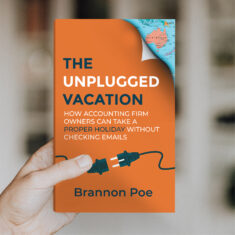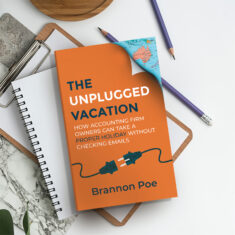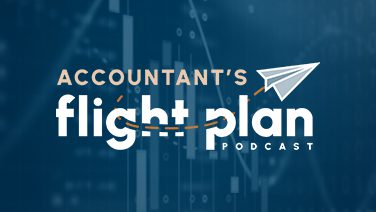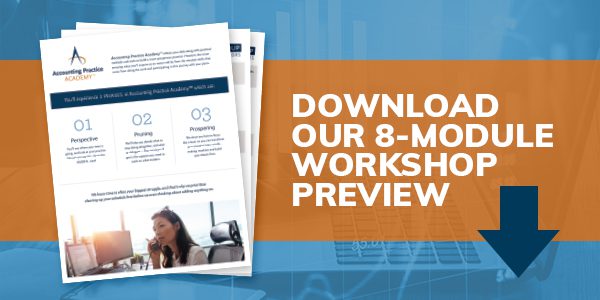This blog is full of useful bits of wisdom and highlights some of the most important points in our new book The Unplugged Vacation.
This article first appeared in The Journal of Accountancy’s CPA Insider™ By Brannon Poe, CPA.
Ten years ago, buyers of accounting practices rarely would even ask about owners’ work hours; now, it’s one of the very first questions that come up. Owners’ hours directly impact the value of a practice: If all other things are equal, buyers prefer to buy an accounting practice with fewer owner hours. Today’s CPAs aren’t interested in working as much as their predecessors did—but that doesn’t make them lazy. Instead, they want to work more efficiently so they can have more time for themselves and their families.
Current owners should embrace this trend for several reasons. First, if you’re more strategic about your time, working less can actually help you create a more profitable accounting practice. It can make your career and your life far more enjoyable. And, whether you’re a solo practitioner or the managing partner of a multi-professional firm, reducing your hours will certainly make your practice more marketable when it is time to sell.
How can working fewer hours make your business more productive? I’ll begin my case with a well-known principle. In the early 1900s, Italian economist Vilfredo Pareto observed that approximately 20% of the people owned 80% of the land in Italy. This commonly became known as the 80/20 principle, or Pareto’s Principle. Interestingly, this unequal distribution applies not only to wealth distribution, but to many other things as well. For example, 20% of your carpets may receive 80% of the wear. Or 20% of your clothes may get 80% of the use. The point: There is generally an unequal distribution (though not always an 80/20 one) when it comes to human endeavors.
The Pareto Principle also applies to business. A small percentage of your clients can produce a large percentage of your revenue and profits. A small number of your clients often require a large amount of energy and resources. It also stands to reason that a small amount of your time produces the lion’s share of the value experienced by your clients. The trick to working less is to apply this principle to your business and increasingly focus your efforts on the most productive 20%.
After having worked with thousands of accountants since 2003, we have concluded that the most successful (and happiest) practice owners take a significant amount of time off each year, and that is a major driver of their success.
One reason why: That time off helps owners identify aspects of their business that need improvement. When they return to the office after vacation, they can tell which staff members stepped up and which didn’t. Problems that occurred when they were away can also help them locate trouble spots. Owners can then determine what changes need to take place to make clients and staff less dependent on them.
Another reason time off is helpful is that it helps owners develop a clarity about their practices that they can gain only when they are able to unwind. Think back to how many times you have you made crucial, groundbreaking, paradigm-shifting decisions during a long vacation. (I typically experience at least one work-related “ah-ha” moment on any given trip.)
So how do you work less—but more efficiently? Try these strategies.
Set boundaries around time off.
Time off should be viewed as an investment rather than a luxury. It’s necessary to rejuvenate your most important asset—yourself—and keep you performing at a high level. Setting boundaries around your time off is the “just do it” strategy—and it works. (Have you ever noticed that your productivity is very high when you are preparing to take a vacation?) Get out your calendar and plan up to a year in advance when you are going to get away. Book your trips so they become unmovable blocks of time where you won’t be working. Don’t fall into the trap of taking your laptop or smartphone with you on vacation. This will maximize the investment in your time off.
Ask yourself what you can stop doing.
The most common mistake we see with underperforming practices is the attempt to get into too many lines of business. It’s a recipe for low profitability and time wasted. If you’re highly diversified in your service offerings, you likely have a few that are not all that profitable at best and that lose money at worst. Perform a realistic analysis of your offerings to determine which ones don’t give you enough return on your investment. Note that if no one in your firm focuses on a particular specialty, profitability in that area will likely be less than optimal.
Be more selective about clients.
Just as entire lines of work can be wrong for your practice, the same can be true of certain clients. More often than not, owners are aware of this fact but, for one reason or another, don’t act on it. Regularly culling some clients will free up your time and energy immensely.
Switch to value pricing.
Measuring time for billing purposes is counterproductive to the mindset required to truly free up your personal time. It causes you to value your work in terms of how much time you spent on it, rather than by more meaningful criteria, such as how much money you saved or helped earn for your clients. For most work in public practice, the number of hours spent on a project is simply not an important measurement. It does not reflect the value of your work, and it should have very little to do with what you should charge.
Once habits are established, they can be difficult to undo. Changing the way you work takes a leap of faith and no small amount of motivation. The best way I know to stay motivated to implement major changes is to focus on the why. Ask yourself these questions, and keep the answers in the forefront of your mind: How would it benefit you personally to work less? What difference would it make for your family? Could your practice actually be better as a result? If so, how?
The AICPA Private Companies Practice Section has many resources to help your firm function more efficiently, including a Client Acceptance Evaluation Tool (spreadsheet download), a Client Continuance Evaluation Tool (spreadsheet download), and a guide to pricing and profitability (PCPS member login required). (If you go to the original article by clicking the link at the top of this page, you can download these spreadsheets directly from the post.)
Download our free E-book The Unplugged Vacation for more useful information on how you can work less and grow your business. Happy Reading!








